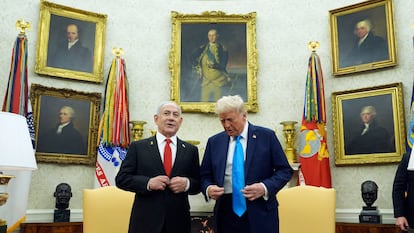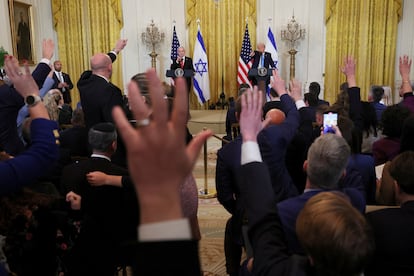Trump says US ‘will take over’ Gaza
The White House says the president does not want to impose his proposal to evacuate the Strip but rather seeks ‘creative solutions’ with Israel and Arab nations

The White House on Tuesday defended Donald Trump’s proposal to expel 1.5 million Palestinians from Gaza and resettle them in other Arab countries. Shortly before the meeting between the U.S. president and Israeli Prime Minister Benjamin Netanyahu, a senior official tried to clarify the main lines of a plan that has already been strongly rejected by Arab nations. According to this senior official, Trump “looks at the Strip and sees a demolition site” that will take “between 10 and 15 years” to be made habitable again, not the five years foreseen in the ceasefire agreement. It is therefore not practical to require people to live in inhumane conditions for such a long time, said the source, who insisted that Trump is not trying to impose a solution.
The second phase of the ceasefire agreement for Gaza and Iran’s nuclear program were the main topics of the encounter, divided into two parts — a meeting and a working dinner — between Netanyahu and Trump. A conversation in which both sought, moreover, to reset a personal relationship that has traditionally been fractious, but which was of enormous political convenience for both leaders during the Republican’s first term and promises to be so again in his second.
Trump wants to take credit for achieving peace in the Middle East and normalizing relations between Israel and Saudi Arabia during his term in office. Netanyahu believes it is time, once the crises in Lebanon and Gaza have been resolved, to take decisive measures against Iran’s nuclear program, for which he would need Washington’s approval.
The meeting took the format of a major occasion, firstly with a private conversation between the two of them and their closest advisers, and then another with their entire teams. Then followed a working dinner, preceded by a press conference delivered with great fanfare in the East Room of the White House, the largest in the entire presidential residence.
The timing of the talks is crucial. In the Middle East, negotiations were due to resume on the second phase of the ceasefire agreement in Gaza and the exchange of prisoners between Israel and Hamas. The truce is holding up delicately; in Lebanon, the ceasefire between Israel and Hezbollah could expire in the next few weeks; Iran is an unknown quantity, after its allied militias have been severely punished by Israeli forces.
The second phase of the ceasefire with Hamas, after the first lasting six weeks that began on January 19, provides for the withdrawal of Israeli occupation troops from the Strip and the return of the hostages who remain alive. But pressure from the most radical wing of Netanyahu’s government has raised questions about what might happen next: these have demanded that the prime minister put the steamroller of his army in motion again, once the first phase of the truce has expired.

Echoes of the Nakba
In such a breeding ground, Trump’s proposal for the evacuation of Gaza has only made things more complicated. The idea of a forced displacement of the Gazan population has a different sound to it in Washington than in Israel, where a majority supports the idea (according to a poll released Tuesday) including right-wing politicians both in the government and the opposition. On the other hand, it has generated the frontal rejection of Palestinians and Arab countries. They fear that any exit would ultimately turn into an ethnic cleansing reminiscent of the Nakba (”catastrophe” in Arabic), which took place between 1947 and 1949 when hundreds of thousands of Palestinians fled or were expelled in the face of the advance of the Zionist militias and — after the creation of the State of Israel and the beginning of the first Arab-Israeli War — the Israeli army itself. Three-quarters of a century later, Palestinian refugees now number in the millions, including their descendants (most of whom are Gazans), who have never been able to return to homes they said goodbye to, believing they would be back in a matter of weeks.
Speaking to reporters ahead of the meeting, a senior White House official said Trump “sees it as impractical for it to be rebuilt within three to five years [and] believes it will take at least 10 to 15 and thinks it’s inhumane to force people to live in an uninhabitable lot of land with unexploded ordinance and rubble.”
Trump is not trying to impose a response, according to the official, but wants to look for “solutions for helping the people of Gaza have normal lives while the Gaza Strip is ultimately being rebuilt, and he’s trying to look at this in a realistic way.” The U.S. president also wants Arab partners and Israel to contribute to providing “creative solutions” to the problem.
The personal relationship between Trump and Netanyahu deteriorated after the Israeli prime minister congratulated Democrat Joe Biden on his victory in the 2020 elections. During his first term, Trump had made important concessions to Netanyahu, by moving the American embassy from Tel Aviv to Jerusalem and brokering the signing of the Abraham Accords normalizing relations between Israel and the United Arab Emirates and Bahrain in 2020.
One of the two leaders' main ambitions is to complete normalization between Israel and Saudi Arabia, a process that was interrupted by the outbreak of the war in Gaza in October 2023. "The expansion of the Abraham Accords," not only with Riyadh, but with other Arab and Muslim countries, "will continue and flourish during this administration," the official stressed. "It is something that will take time, but it is at the top of our priorities."
The two leaders also discussed Iran’s nuclear program, which Netanyahu, amid Israel’s war with Hezbollah in Lebanon and Hamas in Gaza, has shown himself increasingly willing to go all out against. According to the Yediot Aharonot newspaper, the Israeli prime minister intends to argue that only by going after Tehran will the domino effect of normalizing relations with his country be possible.
Saudi Arabia is one of five countries that has signed a letter to Trump seeking to offer an alternative to forced Palestinian displacement. For months, Riyadh has insisted that it will only normalize relations with Israel when a political path to a Palestinian state is created and a ceasefire is agreed in Gaza. Both demands clash with the demands of Netanyahu’s right-wing allies, who dream of recolonizing Gaza. He, too, opposes the creation of a Palestinian state.
After his trip to the White House, Netanyahu is scheduled to hold separate talks on Wednesday with National Security Adviser Mike Walz and Defense Secretary Pete Hegseth. On Thursday, he will meet with Senate and House leaders and other lawmakers on Capitol Hill.
Sign up for our weekly newsletter to get more English-language news coverage from EL PAÍS USA Edition
Tu suscripción se está usando en otro dispositivo
¿Quieres añadir otro usuario a tu suscripción?
Si continúas leyendo en este dispositivo, no se podrá leer en el otro.
FlechaTu suscripción se está usando en otro dispositivo y solo puedes acceder a EL PAÍS desde un dispositivo a la vez.
Si quieres compartir tu cuenta, cambia tu suscripción a la modalidad Premium, así podrás añadir otro usuario. Cada uno accederá con su propia cuenta de email, lo que os permitirá personalizar vuestra experiencia en EL PAÍS.
¿Tienes una suscripción de empresa? Accede aquí para contratar más cuentas.
En el caso de no saber quién está usando tu cuenta, te recomendamos cambiar tu contraseña aquí.
Si decides continuar compartiendo tu cuenta, este mensaje se mostrará en tu dispositivo y en el de la otra persona que está usando tu cuenta de forma indefinida, afectando a tu experiencia de lectura. Puedes consultar aquí los términos y condiciones de la suscripción digital.








































